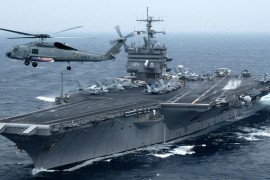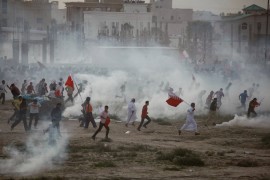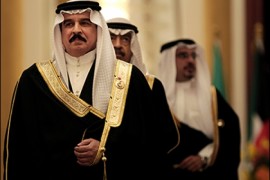In 2004, an American activist, who was keeping an eye on Bahrain’s case, told me after he finished a meeting at the US Embassy in Manama, that the role of the ambassador and the diplomatic crew is relatively secondary in defining the essence of the relations between the small island and the US Empire. The war generals present at the US base in Juffair (a quiet village near Manama), where the Fifth Fleet’s command headquarters are located, are the decision-makers, not the State Department in Washington nor the US embassy in Manama.
The island of Bahrain is merely perceived by American generals as a large aircraft carrier, and a permanent transit station, providing facilities fordozens of pieces of armory, and tens of thousands of soldiers (not just the 4,000 or more residents of the base). Therefore, the security of Manamais vital for military operations in the Gulf, which handles about a quarter of the world’s oil exports and embraces the huge reserves of the world’s energy, as well as the security of Israel which is not far from the range of the missiles of Iran, the bitter foe of Washington.
Interestingly, a few days prior to the GCC military intervention in Bahrain in March 2011, the former US Secretary of Defense Robert Gates said that the Manama authorities should carry out political reforms as if he actually supports the democratic demands brought by congregants at the Pearl Roundabout (15 February – 17 March, 2011). Also, the Ministry of Defense (Pentagon) and the US Department of State both implied that theSaudi army entry to Manama was without consultation with Washington. The former US Secretary of State Hillary Clinton also mentioned that inher diary, which was published recently. However, the confirmed information that is now available states that it is a lie and that the US administration was informed of the Al-Saud military forces’ intervention to suppress the revolution of unarmed people. Perhaps America asked forthis intervention when it noticed the collapse of its ally, the Al-Khalifa regime. Washington had certainly coordinated that invasion, which some of the opposition forces call an “occupation” because no one can imagine how such an entrance of undesirable forces into “a giant aircraft carrier = Bahrain” is possible without permission of the Fifth Fleet commander.
Pentagon’s approach, which gives preference to the military fleet over everything else, succeeds in Bahrain
It is confirmed that after several months of this intervention, and specifically in July-August 2011, the Pentagon extended its military cooperationagreement with the Al-Khalifa authorities. Prior to that, specifically in May 2010, Washington declared the expansion of its base in Bahrainthrough the annexation of Mina Salman on an area of about 28 hectares (70 acres), at a cost of approximately $ 580 million, and that the expansionends in 2015.
But the US military presence is not limited to the base in Juffair, but also extends to Shaikh Isa’s Air Base near Riffa (where the Al-Khalifa rulingfamily reside), and the Bahrain International Airport in Muharraq. Bahrain thus stands out as an active intelligence station. Thus, the protection ofthese enormous facilities, in which Washington has invested a lot in nearly six decades, is of real importance to the Pentagon rather than the human rights situation and demands for reform.
One day after another, it is clear that the policy of the Pentagon, which gives preference to the military fleet over all other matters, succeeds inBahrain on top of any other US approach if we suppose that there is differentiation between the stance of admirals and centers of power such as theMinistry of Foreign Affairs, the National Security Council, and the White House regarding the stability requirements of the Bahraini case.
It seems that the pro-dictatorship role of the Pentagon was clear for most of the political opposition groups, which have not yet been able to meet with officials from the Fifth Fleet headquarters in Manama or the Department of Defense in Washington. Perhaps the opposition seemed mired indebate with human rights officials in the State Department, and most recently Tom Malinowski, who was expelled from Manama publically last July. The opposition meetings did not develop into meetings with high-level political officials rather than those human rights defenders.
Observers believe that the meetings of the opposition with officials of this kind are nothing more than a waste of time or at least not effective enough as they hoped for. I reiterated such remarks repeatedly in my meetings with some opposition figures, especially when they thankfully show their understanding towards human rights officials in the State Department.
Of course I do not suggest these meetings should be stopped but should be structured in a better way, with my sincere thanks to Michael Posnerand Malinowski as prominent defenders of human rights who have publically recorded condemnations against the violence practiced by Al-Khalifa.
I have a presumption and find it worthwhile to be debated. I find it very likely that a lot of the American diplomatic effort, like that of Posner,Malinowski and others, is in tune with the aspiration of the American admirals to calm the opposition party in a desire to contain it. That is, Posnerand Malinowski are working in perfect harmony, well almost perfect, with generals who have visions closely related to those of the Royal Palace in Sakhir. These generals provide support for radical components in the Bahraini regime and other authoritarian systems in the region, and view them as reliable partners
It is known that intensive meetings are taking place between officials from Al-Khalifa and American commanders and other diplomatic officials, but the last two are not appreciative. Over the past three years, Bahrain’s government has launched an aggressive public campaign against the former US Ambassador Thomas Krajeski although it is difficult for the observer to comprehend that a small country like Bahrain runs down the Ambassador of a superpower. The ambassador Krajeski left Manama after his diplomatic failure in managing relations with Bahraini officials,according to the assessment of generals. The new US ambassador William Roebuk should learn from his predecessor’s mistake so as not toundermine the discontent of the Al-Khalifa regime and that of the Pentagon. He should be a copy of the current British Ambassador, Iain Lindsay:deaf and is unable to listen to the suffering people he is living among, as if he is living on Mars. Malinowski, who the generals did not feel sorry for after his humiliating expulsion from Manama last summer, should learn how to converse with the Al-Khalifa family, which is sponsored by thegenerals.
Of course, this does not prevent Malinowski, if he could come to Manama or through other diplomatic frameworks, to send the opposition the Pentagon’s message regarding their participation in the elections. Because the opposition did not participate, Washington may be forced to reduce the level of relations with them.
However, this still does not prevent the opposition societies, led by the Shiite Al-Wefaq, to send contradictory signs to the fleet, once welcoming its presence and others finding it debatable. The arrogant generals seem to accept versions that imply interpretation from those who they regard asloyal to Iran, although they are warmly welcomed by the Al-Khalifa.
Finally, perhaps the opposition’s effort, as long as it is in the regional and international context, which is influential in Bahrain path, should includecommunicating with the American generals and politicians, not just with the human rights defenders




